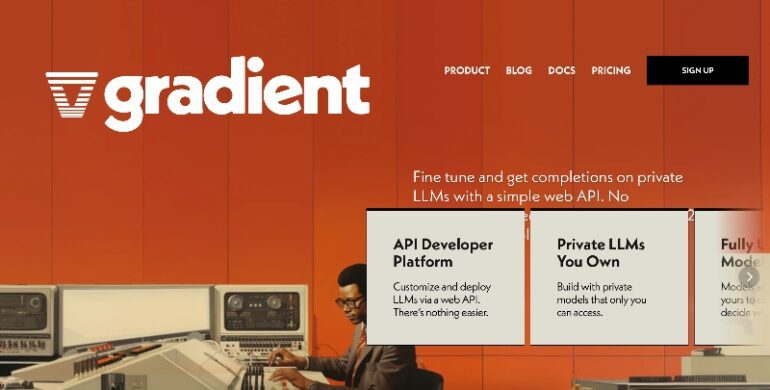TL;DR:
- Gradient, an AI API platform, has successfully raised $10 million in seed funding led by Wing VC, with prominent investors like Mango Capital and Tokyo Black.
- The funding aims to advance Gradient’s enterprise-focused development platform and democratize access to AI.
- Gradient enables companies to leverage private data to build custom AI models effortlessly, including domain-specific LLMs for healthcare, finance, and law.
- The platform prioritizes security and privacy compliance, making it suitable for sensitive environments.
- Christopher Chang, Gradient’s CEO, highlights the platform’s role in simplifying AI development and providing flexibility for developers.
- Various industries, from healthcare to marketing, have benefited from Gradient’s generative AI applications.
Main AI News:
In a groundbreaking move, Gradient, the pioneering API platform for AI developers, has successfully secured $10 million in seed funding. Leading the investment charge is Wing VC, accompanied by notable backers, including Mango Capital and Tokyo Black. The round further saw enthusiastic participation from The New Normal Fund, Secure Octane, and Global Founders Capital, along with a slew of distinguished AI and data experts hailing from industry giants like Snowflake, Netflix, SAP, Figma, Airtable, Pinterest, Motive, and Openstore. This infusion of capital is poised to catapult Gradient into the forefront of AI innovation, advancing both its enterprise-focused development platform and its noble mission of democratizing access to AI.
What sets Gradient apart is its unique ability to empower companies to harness their private data for the creation of large-scale custom AI models through its developer platform. At the heart of this developer experience lies the cutting-edge LLMs (Large Language Models) such as Llama2. Gradient empowers developers to effortlessly craft and integrate thousands of finely tuned LLMs at a minimal cost and with remarkable simplicity—something hitherto deemed unattainable.
Moreover, Gradient extends its reach with proprietary LLMs tailored for healthcare, finance, and law, further customizable to tackle domain-specific challenges. Its public platform operates on a pure on-demand basis, with users only paying for the tokens they consume. Enterprises, meanwhile, have the flexibility to opt for dedicated deployments, tailoring their AI journey to their specific needs.
Chris Zeoli, Partner at Wing VC, enthused about the game-changing potential of Gradient, saying, “Building a custom, production-ready AI application typically requires a team of data engineers, machine learning experts, and data scientists – a huge amount of infrastructure investment – but that’s all set to change. AI development is moving at breakneck speeds, and the Gradient team has built a platform that really provides the best of both worlds – simplifying the development process, but also allowing developers the flexibility to work with the best-in-class open-source models and to leverage tools like Hugging Face, LangChain, LlamaIndex, and Pinecone.”
Empowering AI Innovation: The Next Chapter of Gradient
Gradient’s arsenal of features includes:
- Full Model Ownership: Companies can maintain full ownership and control over their AI applications developed on Gradient.
- Rapid LLM Creation: Gradient’s developer platform empowers users to effortlessly fine-tune hundreds of LLMs and embed models to address complex use cases.
- State-of-the-Art Domain Expert LLMs: Gradient unlocks the potential for companies to build upon Llama2 models and domain expert models tailored for finance, healthcare, and law.
- Security and Privacy: Gradient stands as a bastion for companies seeking to productionize models in highly sensitive environments, safeguarding user data and privacy with SOC2 and HIPAA compliance.
Christopher Chang, co-founder and CEO of Gradient, emphasized their mission, stating, “We provide our customers with the easiest, truly on-demand developer API for LLMs. This enables any company to quickly proliferate its AI-augmented workforce and maintain competitive advantage.”
The transformative impact of Gradient has already been felt across various sectors, including healthcare, financial services, marketing, media, and entertainment. Application developers, product teams, and ML engineers have harnessed Gradient’s power to create and deploy generative AI applications that address diverse business needs.
“Working with Gradient has really changed the way we think about harnessing AI,” shared Leo Pekelis, Head of Data at Cloudtrucks.
Publicly available for enterprise and self-service developer access, Gradient’s journey has been spearheaded by industry veterans Christopher Chang, Mark Huang, and Forrest Moret, who previously honed their AI expertise at Netflix, Google, and Splunk. Their vision for rapid AI development is now a reality, thanks to the transformative potential of Gradient.
Conclusion:
Gradient’s successful $10 million seed funding round underscores the growing importance of accessible AI development in today’s market. With a strong focus on simplifying the AI development process and empowering companies to leverage their private data, Gradient is poised to drive innovation across various sectors. This funding not only boosts Gradient’s capabilities but also signals a changing landscape in AI development, where ease of use and flexibility are paramount for companies seeking a competitive edge in the market.

